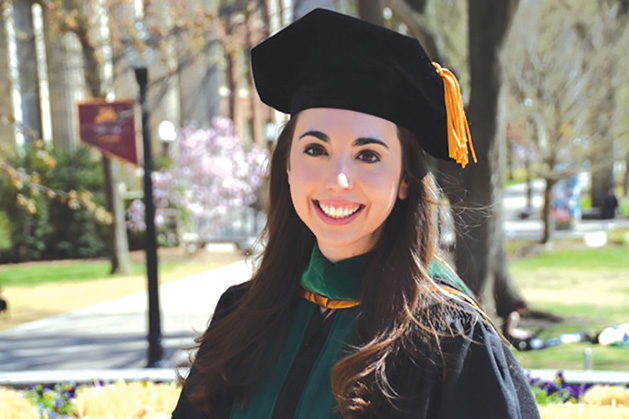
Like all physicians, Jessica Ulrich, M.D. understands hospitals, chronic illness, surgery and medication. And while her medical degree from the University of Minnesota and pediatric residency at the Mayo Clinic have given her one side of the equation, it’s her life-long battle with Crohn’s disease that makes this young doctor uniquely qualified to help her patients.
“It took almost two years to get an answer,” says Woodbury native Ulrich, who, at the age of 14, was diagnosed with Crohn’s disease, an inflammatory bowel disease that affects the body’s ability to process food and nutrients and leads to partial or complete bowel obstructions. According to the Crohn’s and Colitis Foundation, 1.6 million Americans have chronic inflammatory bowel disease.
“It started with a volleyball coach who noticed I was losing weight and asked my parents if everything was okay. I was falling off the growth chart, and was having a lot of pain and had recurring fevers. I missed a lot of school and I had no energy,” she says. “ I just remember being in my room crying, doubled over in pain, and me and my family were just at the end of our rope and wanted to figure out what was wrong.”
Ulrich finally had an upper endoscopy and colonoscopy procedure, which led to her diagnosis.
“It was a really difficult time as a teenager,” she says. “A lot of the symptoms of Crohn’s disease are not things you want to talk to your friends about—a lot of time in bathroom.” She’d go on to have her teenage and early adult years revolve around managing her condition. This meant a tricky diet, at times only eating protein shakes or pureed foods; medications of steroids, pills, and IV infusions; frequent hospital stays; and eventually major surgery.
“My family was amazing. We cancelled many vacations due to me being ill. Wherever we went it was always with the contingency of, ‘Where is the nearest hospital?’ It changed our life and our lifestyle, because Crohn’s disease is very unpredictable,” she adds.
In spite of her chronic condition, Ulrich was encouraged to still go after her dreams. She was inspired by her own doctors to go to medical school. In spite of some setbacks, including a year off of medical school for a bowel surgery where she had 18 inches of her small intestine removed along with her appendix, she persevered.
Today, Ulrich is the healthiest she’s been. She’s engaged to be married and doing her pediatric residency at Mayo, working toward her specialization in pediatric gastroenterology, and hopes to use her experiences to help others.
“Crohn’s disease is brought on by stress, so a residency isn’t exactly a stress-free environment, so it’s a balance. I feel like I’ve been able to put that part of me that was always focused on my health and put it towards learning as a pediatrician, toward my patients and their families,” says Ulrich. “I had a patient the other day who was telling me about how much trouble she has sleeping in hospitals—I’ve been there and it’s not an easy thing—so I just spent a while talking to her and her family about ways I’ve found to help you sleep in a hospital. The family was just so appreciative of having a physician who understood the struggles of also being a patient. I feel like it’s a very unique perspective that not everyone has, and to be able to help a patient in any little way has been extremely rewarding.”









